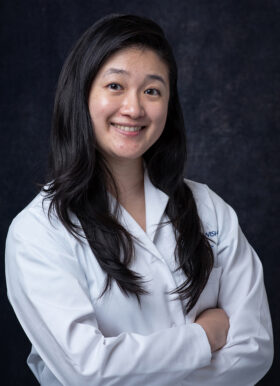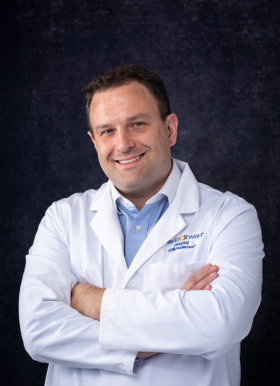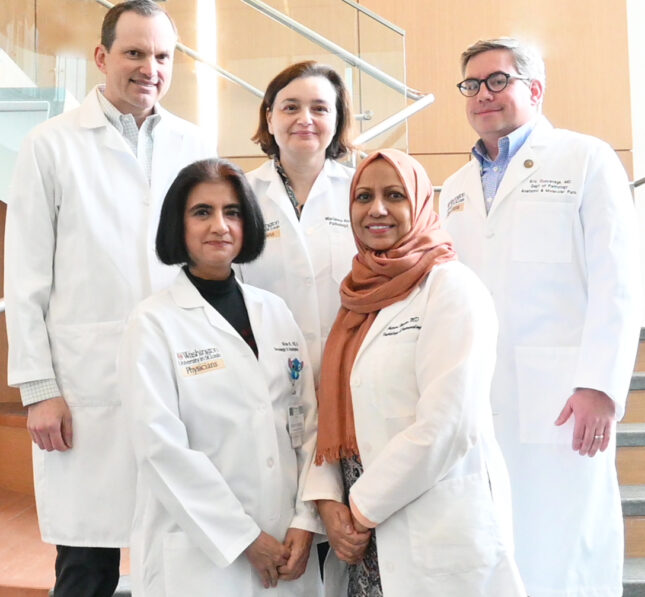
The Hematopathology section of the Department of Pathology & Immunology offers a clinical fellowship for qualified applicants. This service includes adult and pediatric hematopathology, flow cytometry including measurable residual testing in B-ALL and exposure to molecular and cytogenetics laboratory testing in hematopoietic malignancies. Approximately three months of assigned elective time is provided to cover benign/wet hematology, performance of bone marrow biopsy procedure, Patient Safety and Quality improvement projects, research, molecular diagnostics, genomics and/or cytogenetics.
The hematopathology fellowship was fully accredited in December of 1996. To date, 52 fellows have graduated from the fellowship program.
The large referral quaternary care and urban hospital system associated with Washington University in St. Louis provides a broad range of cases comprising about 3,500 in-house marrows (cores and aspirates), more than 3,500 lymph nodes and other surgical and non-surgical specimens and about 700 consult cases per year. The Adult and Pediatric Bone Marrow Transplant services together perform approximately 360 transplants annually. Due to the high volume and diversity of cases, the fellows gain extensive diagnostic experience in the field of hematopathology, including uncommon disease entities, such as mature T-cell and NK-cell neoplasms and immunodeficiency-associated lymphoproliferative disorders. The fellow’s responsibilities are broad and an increasingly independent approach to case work-up is encouraged. The fellow is regarded as the initial pathologist on all cases and is expected to write pathology reports integrating morphologic description and all ancillary studies (immunohistochemistry, flow cytometry, molecular and cytogenetic testing results). The fellow is seen as the primary contact for referring physicians and will be working closely with the clinical hematology/oncology fellows and faculty, gaining insights into the clinical management of patients.
The fellows present weekly at the lymphoma and bone marrow transplant conferences, monthly at cytogenetics and molecular correlation conferences, and at journal clubs assigned to them. The fellows are expected to participate in Patient Safety and Quality improvement projects and optional hematopathology-related translational projects for which funding is available.
Trainees with strong basic research interests can opt to be part of a stimulating and collegial research community with top-notch facilities and resources to achieve their future goals. Exposure to next generation sequencing data analysis of targeted cancer genes associated with hematologic malignancies can be obtained during the elective time, if the fellow desires additional clinical exposure to this evolving field of molecular hematology.
This program provides a strong basis for clinical practice including challenging cases in both adult and pediatric hematopathology, as well as opportunities for cutting-edge basic, translational and clinical research. Upon completion of the program, the fellow will have the necessary skills and experience to successfully pursue a clinical and/or academic career in hematopathology.
Training for the fellowship occurs in state-of-the-art facilities at Washington University School of Medicine/Barnes-Jewish Hospital/St. Louis Children’s Hospital. The Hematopathology section is located in the 680,000-square-foot BJC Institute of Health (BJCIH) at Washington University School of Medicine, which is an 11-story research building housing laboratories and support facilities and is Washington University’s largest building.
Applicants must have a MD or DO degree (or foreign equivalent with ECFMG certification) and 3 to 4 years of training in anatomic, clinical or anatomic and clinical pathology in an ACGME accredited program or in an RCPSC-accredited or CFPC-accredited residency program located in Canada. Fellows must be board-certified or board-eligible in anatomic, clinical, and/or clinical pathology. Applicants must be legally authorized to work in the United States.
The selection process for prospective fellows in Hematopathology is switching to the NRMP Pathology Fellowship Match for positions that begin in 2026 in which our program has agreed to participate. Please read the Society for Hematopathology FAQ document for additional information.
Applicants must complete the online application and provide their CV, personal statement, photograph, USMLE scores (step 3 optional), and ECFMG certificate if applicable. The application portal will collect contact information for three individuals who will be asked to write letters of recommendation.
Applications for the 2026-2027 position will open on October 1, 2024. Please apply at fellowships.path.wustl.edu.
The proposed timeline for the Match is as follows:
January 2025: programs start interviewing
February 5, 2025: match opens for registration to programs and applicants
March 12, 2025: ranking opens
April 16, 2025: rank order list certification deadline
April 30, 2025: match day
July 2026: start of fellowship
Letters of Recommendation will be solicited via our application portal, but can also be directed to:
Yi-Shan Lee, MD, PhD
Program Director, Hematopathology Fellowship
Washington University School of Medicine
660 South Euclid Avenue, Campus Box 8118
St. Louis, MO 63110
lee.yi-shan@wustl.edu
For general questions, please contact the fellowship program coordinatorKim Green at greenkd@wustl.edu.
Faculty
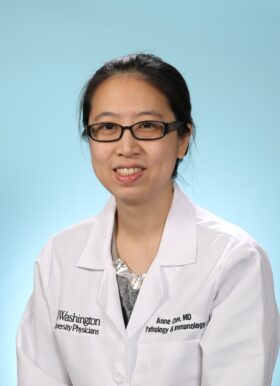
Anne Chen, MD
Assistant Professor, Pathology & Immunology
- Phone: 314-273-8539
- Email: canne@wustl.edu
Division: Anatomic and Molecular Pathology
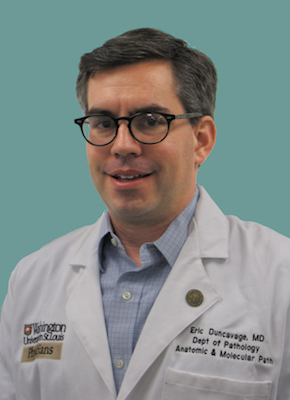
Eric J. Duncavage, MD
Professor, Pathology & Immunology
Division Chief, Genomic and Molecular Pathology
Section Head, Molecular Oncology
- Phone: 314-747-2007
- Fax:
- Email: duncavagee@wustl.edu
Division: Genomic & Molecular Pathology
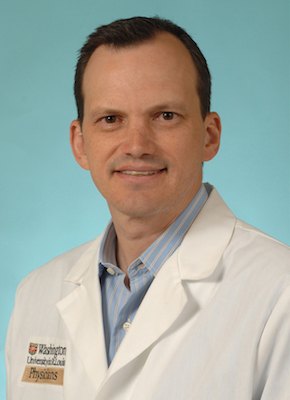
John Frater, MD
Professor, Pathology & Immunology
Section Head, Flow Cytometry
- Phone: 314-362-1553
- Email: jfrater@wustl.edu
Division: Anatomic & Molecular Pathology
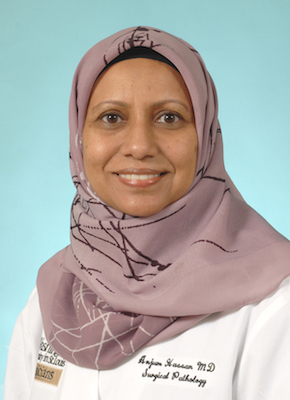
Anjum Hassan, MD
Professor, Pathology & Immunology
- Phone:
- Email: ahassan22@wustl.edu
Division: Anatomic & Molecular Pathology
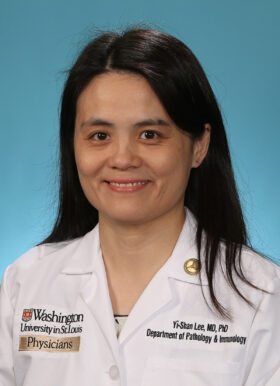
Yi-Shan Lee, MD, PhD
Associate Professor, Pathology & Immunology
Director, Hematopathology Fellowship
- Email: lee.yi-shan@wustl.edu
Division: Anatomic & Molecular Pathology
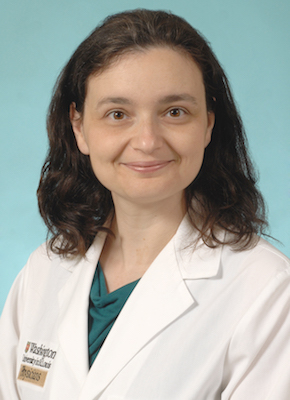
Marianna Ruzinova, MD, PhD
Professor, Pathology & Immunology
Section Head, Hematopathology
Director, Immunohistochemistry
- Phone: 314-362-7704
- Email: mruzinova@wustl.edu
Division: Anatomic & Molecular Pathology
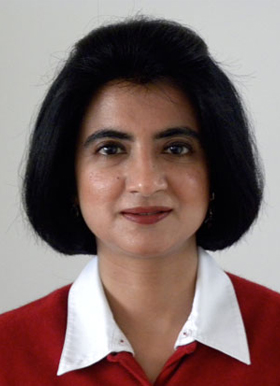
Kiran Vij, MD
Associate Professor, Medicine
Associate Professor, Pathology & Immunology
- Phone: 314-454-7425
- Fax: 314-747-4392
- Email: kvij@wustl.edu
Division: Anatomic & Molecular Pathology
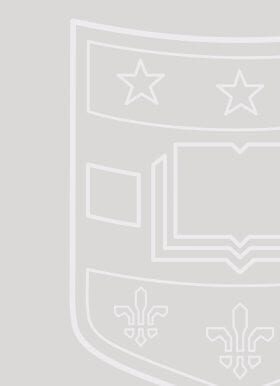
Jephne (Tianjiao) Wang, PhD
Manager of Clinical Genomics and Hematopathology
- Phone: 314-363-6010
- Email: tianjiao.wang@wustl.edu
Trainees
Contact information
Lana Torry
Senior Fellowship Program Coordinator
Phone: 314-273-5476
lanaktorry@wustl.edu
